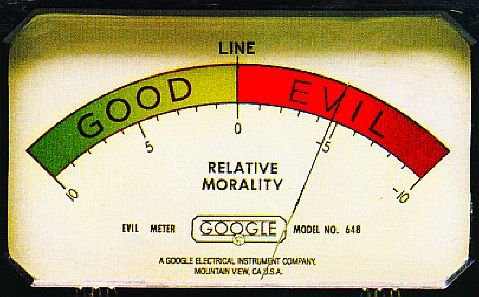Where is the dividing line?
How many lives need to be saved in order to morally justify the murder of an innocent person? Imagine yourself locked in an underground complex with only enough oxygen for a certain amount of people, for a certain amount of time. You are in there waiting for the air outside to reach breathable levels again, but it has been an extra month and oxygen is running low. The math is irrefutable, everybody would make it until the air was breathable again if one person was eliminated, but everybody will die if not. Nobody wants to volunteer to be the one to die. How large does this group of people need to be in order for the murder of the innocent person to be moral? Since morals are relative and all... 3? 4? 10? 100? 1,000?
How many people need to benefit from theft in order for theft to be moral? If you were stealing from your neighbors and then giving it all to people in the poorest country in the world, how much would you need to help those people in order for your theft to be moral? If morals are relative, then it should be considered completely moral when stealing from people who are filthy rich in comparison just for having indoor plumping, never mind a car or a smartphone in their pocket, right?
How many people need to benefit from fraud in order for it to be a morally acceptable action to lie to somebody in order to gain consent? If one of those internet scam artist were to always give there money to people who were relatively much poorer than those who they scammed, then would their action of fraud turn moral?
If a rapist were to record themselves raping somebody and then sell it online, how much money would be needed to be made and donated to a charity in order to make the rape morally acceptable? How many people need to benefit from rape in order for the rape to be moral? If 20 people profit when raping somebody while only one person suffers, would the profit of the 20 outweigh the suffering of the one? How about 100,000 to 1? There has to be a line somewhere, right? Since morality is relative and all...
Really though... Where is the line? Hypothetically, I have zero cars, you have one, your neighbor has two, while Jay Leno has hundreds; are we morally justified to go take a couple of his cars? Or can we just agree that theft is theft; rape is rape; assault is assault; murder is murder; fraud is fraud; and that they are all universally immoral actions.
Immoral actions remain immoral despite people benefiting from them.

Moral relativism is the kind of doctrine that tricks people into believing that taxation is not theft, and that statism is not slavery. They will agree with you that theft is universally immoral, but then say that taxation isn't theft. It turns into the concept that theft is always bad, unless you can help more people than you hurt, then it is good, because moral relativism. That is a very dangerous way of thinking, and it's how legalized mass extortion rackets are formed and or sustained. They will agree that taking 100% of the effects of somebody's actions without their consent is slavery, but then say that it is morally acceptable to have an imperious authority taking up to 50 percent or more of incomes and coercing people to give them a portion of virtually every transaction that they are involved in. That is compartmentalization; a psychological defense mechanism that subconsciously kicks in to protect you from experiencing cognitive dissonance. The first step, as always, is acknowledgment.
Informed consent is the factor that determines the morality of an interaction. You can't build morality on a foundation of subjective preferences. Not all preferences are subjective. Coercion and consent are polar opposites. The moment that coercion is desired, it's consensual. Consent is universally preferred to coercion, which makes it a universal and or objective preference. Even all non-humans express discontent during the violation of their non-consent. Even thieves prefer not to be stolen from; rapist prefer not to be raped; and frauds prefer not to be lied to. These things are universal, and to perform one of these actions, is to act immorally.
It doesn't matter how many people benefit from your immoral actions, they are still immoral! Ends do not morally justify means.

"Even all non-humans express discontent during the violation of their non-consent."
^ and that's why to be more moral and follow the moral truth in greater degrees of alignment, unity, harmony and embodiment, requires one to go further on the path and way of living in moral truth, to become a "vegan anarchist". Truth is ONE way. Go ALL the way. Freedom for ALL, end human-imposed enslavement across the board. Take care. Peace.
https://steemit.com/life/@stickman/do-non-humans-possess-the-same-inherent-rights-that-humans-do
in school we were presented with the raft problem. very similar to the underground room. in public high school. there is no level to which the state will not sink to brainwash children. of course they are the most compliant and it's all moral. right?
Thanks for the article really enjoyed it - Today my fb post will be
"Immoral actions remain immoral despite people benefiting from them"
I wonder if we are born to be moral and we turn immoral as a result of our surroundings/environment/learned behavior, any thoughts anyone ?